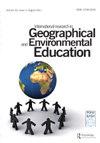Geography’s unkept promises of education for sustainable development (ESD) on geography’s wasted potential to educate for a more sustainable future
IF 3.1
Q2 EDUCATION & EDUCATIONAL RESEARCH
International Research in Geographical and Environmental Education
Pub Date : 2022-12-23
DOI:10.1080/10382046.2023.2158631
引用次数: 1
Abstract
Abstract For decades, geography has claimed to be the school subject with a unique and powerful contribution to Environmental Education and, subsequently, Education for Sustainable Development. Empirical evidence seems to support this agenda showcasing that geographical knowledge, defined as human-environment interaction, can better equip students with the knowledge required in relation to ESD-topics and thus help to work towards a more sustainable future than any other school subject. However, despite the efforts of the last three decades, there is a clear gap between the claim and the reality of geography’s role in ESD. Therefore, using the case of Germany, this article discusses three dimensions of this gap to assist geography in making the meaningful contribution to young people’s lives that it has promised for decades.地理学在可持续发展教育方面的承诺未能兑现,地理学在为更可持续的未来进行教育方面的潜力被浪费
几十年来,地理一直被认为是对环境教育以及随后的可持续发展教育具有独特而强大贡献的学校学科。经验证据似乎支持这一议程,表明地理知识(被定义为人与环境的相互作用)比任何其他学校学科都能更好地使学生掌握与esd主题相关的知识,从而有助于朝着更可持续的未来努力。然而,尽管在过去三十年中做出了努力,地理在可持续发展教育中的作用的主张和现实之间仍然存在明显的差距。因此,本文以德国为例,讨论了这一差距的三个维度,以帮助地理学对年轻人的生活做出有意义的贡献,这是它几十年来所承诺的。
本文章由计算机程序翻译,如有差异,请以英文原文为准。
求助全文
约1分钟内获得全文
求助全文
来源期刊

International Research in Geographical and Environmental Education
EDUCATION & EDUCATIONAL RESEARCH-
CiteScore
5.20
自引率
33.30%
发文量
11
期刊介绍:
International Research in Geographical & Environmental Education publishes quality research studies within the context of geographical and environmental education. The journal endeavours to promote international interest and dissemination of research in the field, provides a forum for critique, and demonstrates the relevance of research studies to good professional practice.
 求助内容:
求助内容: 应助结果提醒方式:
应助结果提醒方式:


